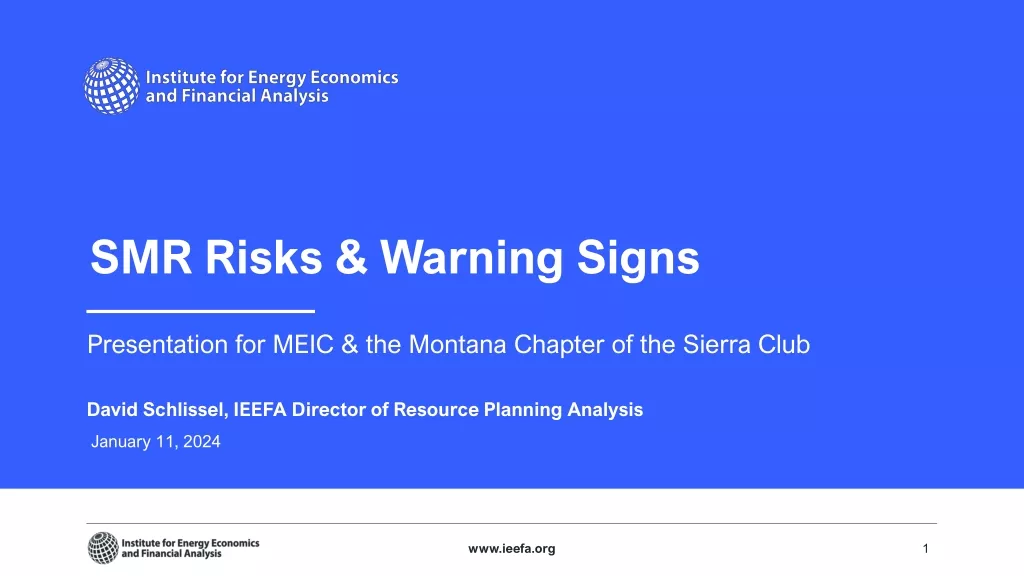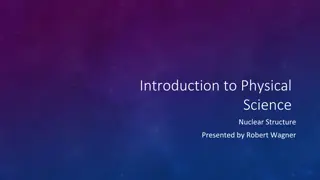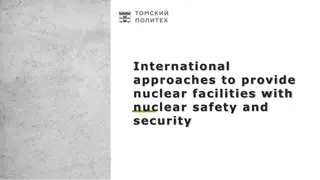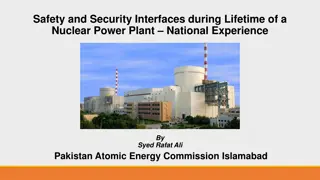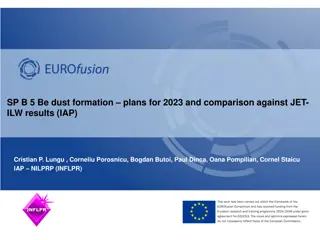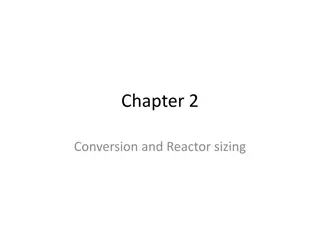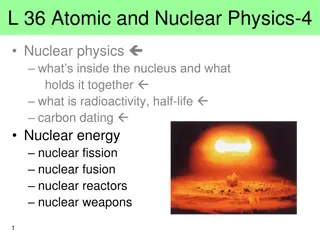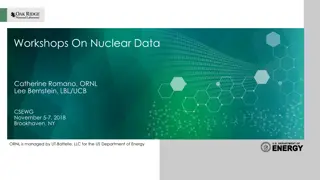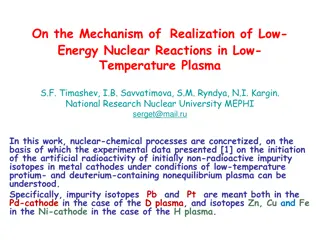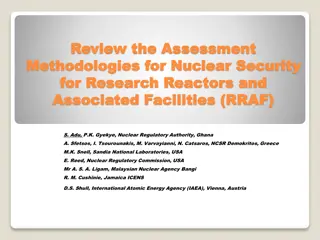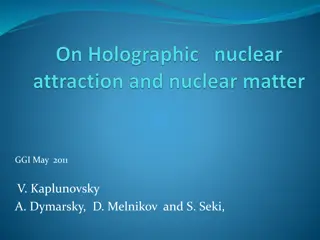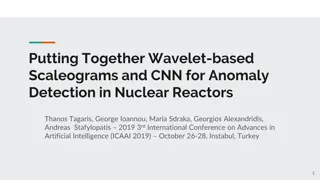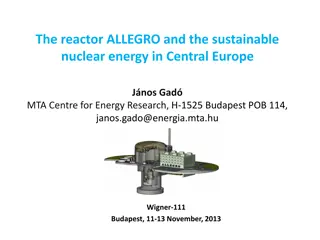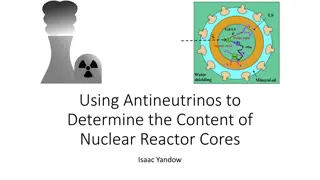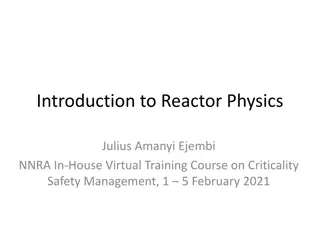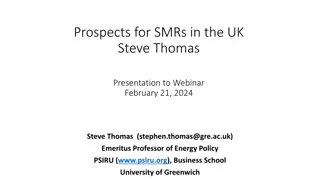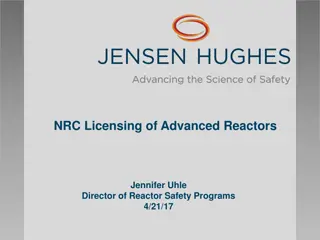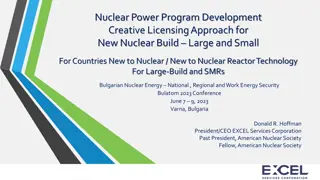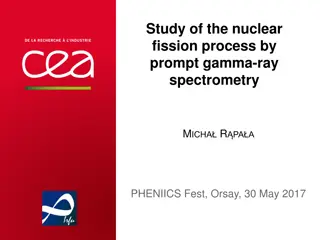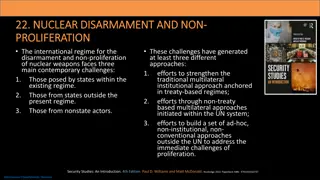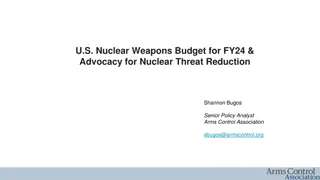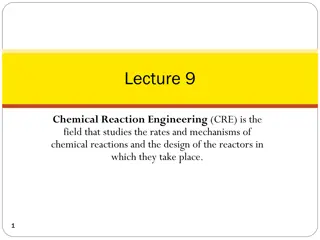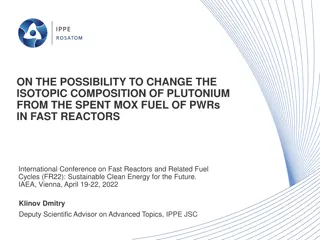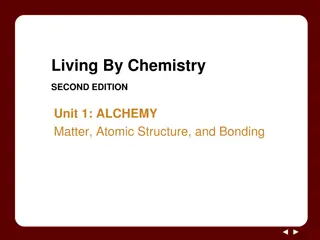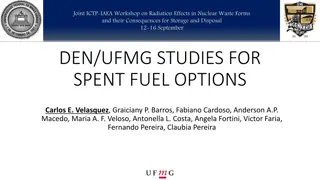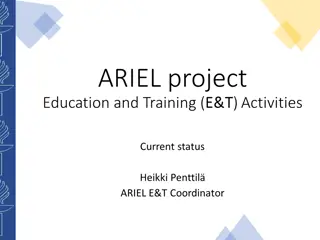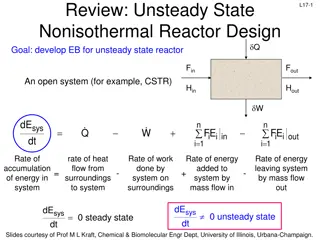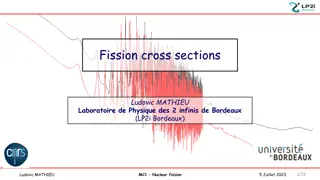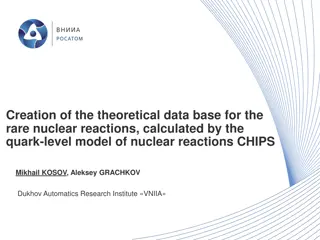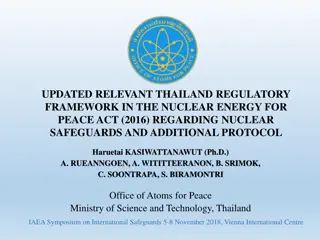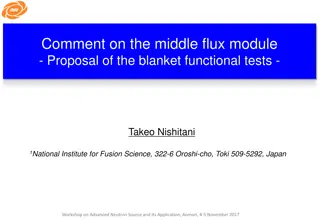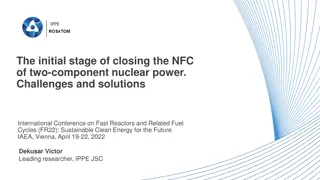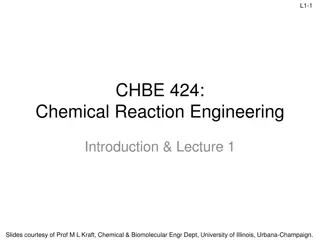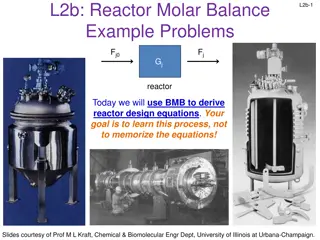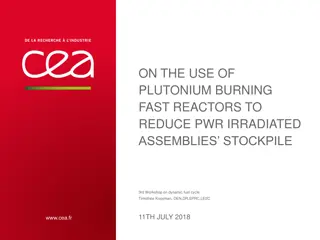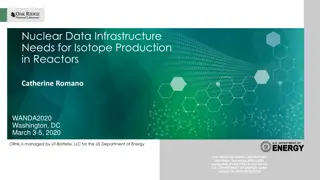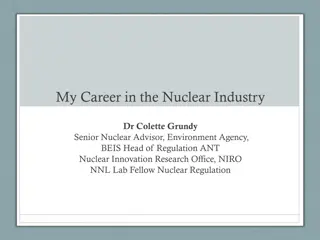Risks and Warning Signs of Small Modular Reactors (SMRs)
Small Modular Reactors (SMRs) are nuclear reactors with a power capacity of 300 megawatts or smaller. Despite potential benefits, there are significant risks associated with SMRs, including cost overruns, schedule delays, lack of construction, and high power prices. The industry's track record raise
4 views • 22 slides
Amended Convention on Physical Protection of Nuclear Material Tabling in Parliament
The Amended Convention on Physical Protection of Nuclear Material (CPPNM) is being tabled for acceptance and ratification in Parliament on 05 September 2023. The purpose is to enhance physical protection measures for nuclear material, especially in the face of increased security concerns post the 9/
3 views • 18 slides
Understanding Nuclear Structure and Forces in Physical Science
Explore the fascinating world of nuclear structure and reactions within atoms, delving into concepts such as nuclear force, binding energy, mass defect, and nuclear stability. Discover the intricacies of nucleons, neutron stars, and the Band of Stability, along with magic numbers that contribute to
6 views • 9 slides
International Approaches to Enhance Nuclear Safety and Security
Understanding the concepts of nuclear safety and security, their differences, and the importance of establishing a robust nuclear security culture are essential for safeguarding nuclear facilities. The International Atomic Energy Agency (IAEA) plays a significant role in promoting nuclear safety and
1 views • 10 slides
Ensuring Safety and Security in Pakistan's Nuclear Power Sector
Pakistan's Nuclear Power Sector operates several nuclear power plants under strict safety and security protocols regulated by the Pakistan Atomic Energy Commission and the Pakistan Nuclear Regulatory Authority. The focus is on achieving nuclear safety to prevent accidents and protect workers and the
0 views • 24 slides
Investigating Be Dust Generation for Fusion Reactors
Investigate the properties of beryllium (Be) dust particles generated using milling techniques for fusion reactors. The study involves analyzing particle size, morphology, crystal orientation, and thermal behavior of Be dust in air and water environments. Laboratory experiments will be conducted to
2 views • 5 slides
Celebrating the Legacy of Magnox Reactors at Wylfa Nuclear Power Station
Explore the rich history and contributions of Magnox reactors at Wylfa Nuclear Power Station, from their pioneering role in electricity generation to the upcoming closure of the last reactor. Join us for insightful discussions on reactor design, waste management, and the future of nuclear energy. Di
0 views • 8 slides
Reactor Sizing and Conversion in Chemical Engineering
This chapter explores the sizing of Continuous Stirred Tank Reactors (CSTR) and Plug Flow Reactors (PFR) using conversion values and overall conversion. It covers the definition of conversion, batch reactor design equations, design equations for flow reactors, and more. The content delves into the m
0 views • 17 slides
Understanding Nuclear Physics: Inside the Nucleus and its Impact
This content explores nuclear physics, covering topics like what's inside the nucleus, radioactivity, half-life, carbon dating, nuclear energy, fission, fusion, reactors, and weapons. It delves into the structure of the nucleus, radioactive decay processes, nuclear reactions, biological effects of r
0 views • 29 slides
Recent Developments in Nuclear Data and Workshops Summary
Recent events in nuclear data include workshops, whitepaper releases, interagency working group meetings, and roadmapping workshops aimed at enhancing nuclear data for various applications. DOE Nuclear Physics has organized interagency working group FOAs to improve nuclear data through collaborative
1 views • 22 slides
Mechanism of Low-Energy Nuclear Reactions in Low-Temperature Plasma
This work discusses nuclear-chemical processes underlying low-energy nuclear reactions in low-temperature plasma environments, focusing on the initiation of artificial radioactivity in metal cathodes under protium- and deuterium-containing nonequilibrium plasma conditions. The role of electrons with
4 views • 6 slides
Comprehensive Review of Methodologies for Nuclear Security in Research Reactors and Facilities
This review assesses methodologies for nuclear security in Research Reactors and Associated Facilities (RRAF). It focuses on applying a performance-based framework to evaluate the protection of nuclear materials and facilities. A case study on the Vulnerability of Integrated Security Analysis method
2 views • 17 slides
Challenges in Security Analysis of Advanced Reactors
Analyzing the security aspects of advanced reactors involves considerations such as physical protection, facility sabotage, nuclear terrorism, cyber vulnerabilities, and emerging technologies. Highlighted risks include the need to protect nuclear material, insider threats, terrorist attacks causing
0 views • 8 slides
Exploring Nuclear Interactions through Holography and Gauge/Gravity Duality
Holography and gauge/gravity duality have proven effective in understanding strong coupling problems in nuclear physics, such as the nuclear binding energy puzzle and limitations of large Nc. This article delves into the implications of applying these techniques to nuclear interactions and nuclear m
2 views • 73 slides
Wavelet-based Scaleograms and CNN for Anomaly Detection in Nuclear Reactors
This study utilizes wavelet-based scaleograms and a convolutional neural network (CNN) for anomaly detection in nuclear reactors. By analyzing neutron flux signals from in-core and ex-core sensors, the proposed methodology aims to identify perturbations such as fuel assembly vibrations, synchronized
3 views • 11 slides
Advancing Sustainable Nuclear Energy in Central Europe with Fast Reactors
Explore the potential of G4 fast reactors for advancing sustainable nuclear energy in Central Europe. Learn how fast neutron spectrum reactors can help address uranium stock depletion, waste elimination, and fuel cycle closure. Discover the regional long-term solution proposed for V4 countries and t
0 views • 12 slides
Utilizing Antineutrinos for Nuclear Reactor Core Monitoring
Plutonium can be clandestinely removed from reactors for nuclear weapons, with neutrinos emitted by reactors providing insights into core contents. Neutrino detectors require high efficiency, energy resolution, and strategic placement. Although detectors meeting these criteria exist, they are not al
1 views • 8 slides
Introduction to Reactor Physics and Nuclear Fission
Explore the fundamentals of reactor physics, neutron interaction, and nuclear fission in this virtual training course on criticality safety management. Delve into the history of nuclear fission, symbolisms for atoms, and the significance of critical reactors like Fermi's Chicago Pile. Gain insights
0 views • 73 slides
Insights on Small Modular Reactors (SMRs) in the UK
Steve Thomas presents an overview of Small Modular Reactors (SMRs), highlighting the challenges and misconceptions surrounding their development and commercial availability. The discussion covers various claims about SMRs, their categorization, and the current status of Advanced Modular Reactors (AM
0 views • 17 slides
NRC Licensing of Advanced Reactors and NuScale Small Modular Reactor Design Overview
Overview of NRC licensing process for advanced reactors, including a focus on Small Modular Reactors under 10 CFR Parts 50 and 52. Details on licensing options, such as Conceptual Design Assessment and Prototype Plants, are discussed. NuScale's Small Modular Reactor design, featuring passive safety
4 views • 12 slides
Nuclear Power Program Development for Energy Security in New Nuclear Countries
EXCEL Services Corporation, led by Donald R. Hoffman, offers innovative licensing approaches for developing nuclear power programs in countries new to nuclear technology. With over 38 years of experience, EXCEL provides essential support services to ensure the success of new nuclear projects, addres
0 views • 25 slides
Study of Nuclear Fission Process Through Gamma-Ray Spectrometry
Delve into the nuclear fission process through prompt gamma-ray spectrometry, exploring motivations, experimental data, and preliminary results. Understand the gamma heating process in nuclear reactors and its significance in reactor safety. Contextualize the study within Generation III+ and IV reac
0 views • 86 slides
Contemporary Challenges in Nuclear Disarmament and Non-Proliferation Regime
The international regime for nuclear disarmament and non-proliferation faces challenges from states within and outside the regime, as well as non-state actors. Various approaches are being utilized to address these challenges, including strengthening multilateral institutions, non-treaty-based multi
0 views • 12 slides
U.S. Nuclear Weapons Budget for FY24 & Advocacy for Nuclear Threat Reduction Overview
The Fiscal Year 2024 budget for U.S. nuclear weapons activities is $56.6 billion, up by 11% from the FY23 request. The budget includes allocations for the Energy Department, Defense Department, and National Nuclear Security Administration for various nuclear weapon delivery systems and warheads. The
1 views • 5 slides
Introduction to Chemical Reaction Engineering (CRE)
Chemical Reaction Engineering (CRE) focuses on studying the rates and mechanisms of chemical reactions, as well as designing reactors for these reactions. The field involves understanding balances in terms of molar flow rates, mole balances, rate laws, stoichiometry, and membrane reactors. Membrane
0 views • 20 slides
Innovations in Reprocessing Spent MOX Fuel for Sustainable Nuclear Energy
Discussion at the FR22 Conference focuses on the potential for fast reactors to modify the isotopic composition of plutonium from spent MOX fuel of PWRs. By utilizing fast reactors like BN-800, countries can alter the fissile isotopes in plutonium, enabling its reuse in thermal reactors and effectiv
0 views • 8 slides
Exploring Nuclear Chemistry: The Formation of New Elements
Delve into the fascinating world of nuclear chemistry with a focus on the formation of new elements through processes like radioactive decay, nuclear fusion, and nuclear fission. Understand how nuclear reactions change the identity of elements and explore the dynamics of nuclear chain reactions. Gai
0 views • 13 slides
Advancements in Nuclear Energy Research and Technology at UFMG
Explore the latest developments in nuclear energy research and technology at UFMG, including studies on radiation effects, nuclear waste forms, thorium reserves, and the National Institute of Science and Technology for Innovative Nuclear Reactors. The Nuclear Engineering Department at UFMG focuses o
0 views • 28 slides
Cutting-Edge Research in Nuclear Physics
Cutting-edge research in nuclear physics is showcased in this comprehensive list of supported education and training applications. Covering a wide range of topics such as time-of-flight spectroscopy, nuclear reactions, data analysis, and neutron capture measurements, this document highlights the wor
0 views • 6 slides
Chemical Reactor Design: Unsteady State and Nonisothermal Reactors
Developing energy balances for unsteady state and nonisothermal reactors is essential for designing efficient chemical reactors. The energy balances involve terms such as heat flow, work done, energy accumulation, and mass flow, which impact the reactor's performance. By considering factors like pha
0 views • 29 slides
Understanding Nuclear Fission Cross Sections
Nuclear fission cross sections play a crucial role in determining reaction rates in nuclear reactors and experiments. They represent the probability of nuclear interactions when neutrons collide with a nucleus, impacting fission and capture rates. These cross sections are influenced by factors such
0 views • 15 slides
Theoretical Data Base for Rare Nuclear Reactions Using Quark-Level Model
The creation of a theoretical data base for rare nuclear reactions using the CHIPS quark-level model is discussed in this research by Mikhail Kosov and Aleksey Grachkov from Dukhov Automatics Research Institute VNIIA. The study aims to predict cross-sections of unmeasured reactions, assess neutron-n
0 views • 18 slides
Thailand's Nuclear Safeguards Regulation in the Nuclear Energy for Peace Act (2016)
The Nuclear Energy for Peace Act (2016) in Thailand has updated nuclear safeguards regulations concerning nuclear safeguards and additional protocols. The regulations cover various aspects such as non-declared activities, complementary access, and specific ministerial regulations related to nuclear
0 views • 5 slides
Proposal for Comprehensive Functional Testing of Blanket Modules in Fusion Reactors
The proposal discusses the need for advanced functional tests of blanket modules in fusion reactors due to the delay in the ITER program. Emphasizing the importance of early nuclear functional testing, it suggests considering partial models for assessments beyond tritium release, such as nuclear hea
0 views • 4 slides
Challenges and Solutions in Closing the NFC of Two-Component Nuclear Power
Strategic goal of transitioning Russian nuclear power plants to a two-component NES, focusing on the initial stage of closing the NFC. Scenario involves thermal neutron reactors with fuel cycle closure using BN reactors. Analysis shows the feasibility of using existing plutonium stockpiles for futur
0 views • 10 slides
Introduction to Chemical Reaction Engineering
Chemical Reaction Engineering (CRE) is crucial for understanding how chemical reactors operate in various processing operations. This field involves reactor design by integrating factors such as thermodynamics, kinetics, fluid mechanics, heat transfer, and economics. CRE aims to effectively design a
0 views • 16 slides
Reactor Design Equations: Basics and Applications
This material covers the foundational concepts of reactor design equations, focusing on molar balance in batch reactors, continuous stirred tank reactors (CSTRs), and plug flow reactors (PFRs). Through detailed explanations and illustrative examples, you will gain a comprehensive understanding of ho
0 views • 20 slides
Plutonium Burning Fast Reactors for Reducing PWR Stockpile
Workshop presenting the utilization of plutonium burning fast reactors to decrease PWR irradiated assemblies stockpile through the CAPRA project. The performance and impact on plutonium inventory are assessed, highlighting the potential reduction and the additional reprocessing and manufacturing req
0 views • 16 slides
Importance of Optimizing Nuclear Data for Isotope Production in Reactors
Optimizing nuclear data is crucial for enhancing isotope production efficiency in reactors. Improved cross section data can lead to cost reductions and material savings by enabling better production optimization. Specific cross sections are required for heavy isotope production, as well as for medic
0 views • 15 slides
Dr. Colette Grundy: A Career in the Nuclear Industry
Dr. Colette Grundy has had a distinguished career in the nuclear industry, serving in various roles such as Senior Nuclear Advisor at the Environment Agency and Head of Regulation at BEIS. Her expertise spans from nuclear regulation to working with international agencies like USNRC and CNSC. She has
0 views • 15 slides
